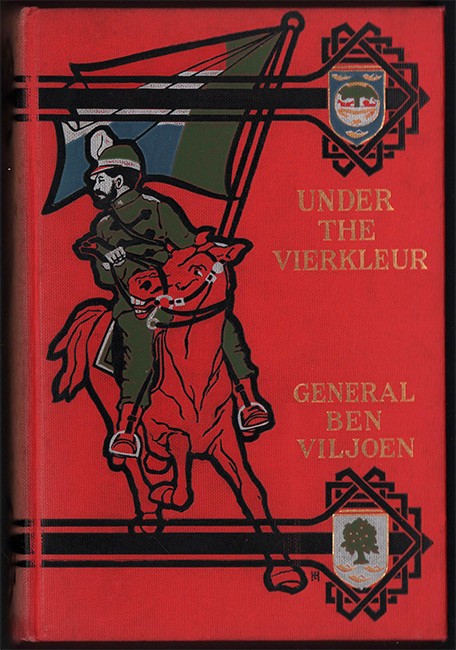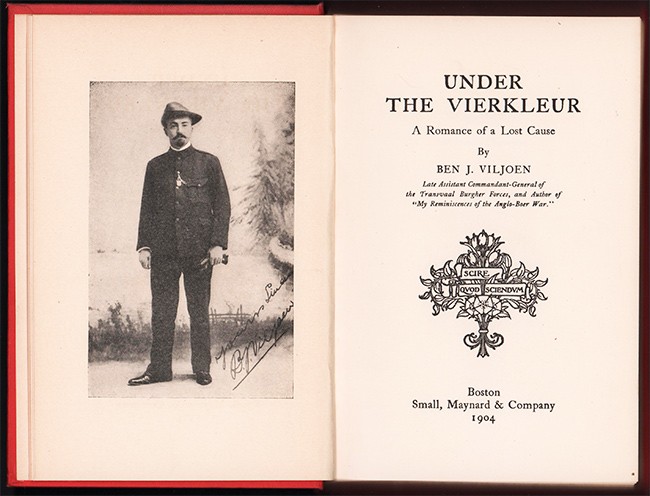385 pages, frontispiece, 5 plates, pictorial red cloth gilt, slightly faded on spine
Published in an edition of 7 000 copies in April 1904.
Mendelssohn (Sidney) SOUTH AFRICAN BIBLIOGRAPHY volume 2 page 568 -569 :In humorously alluding to the fabulous tales about him which had appeared in the British papers, the General remarks that " after the several coups de grace in the field, and the tragic execution at De Aar all which is left of Ben Viljoen still pans out at a fairly robust young fellow quite an ordinary young fellow indeed, thirty-four years of age, of middle height and build," although a periodical narrated how, bound to a chair, and placed near his open grave, he had met his doom with " rare stoicism and fortitude." The work is free from bitterness, and is characterised by a fairness and lack of bragging which favourably distinguishes it from other publications written from the Boer point of view, while the humour, candour, and good-nature displayed in the volume are undeniable. The author was instructed by General Joubert to proceed to the Natal frontier, and he subsequently joined the troops under General Kock's command. He does not appear to have had a high opinion of his leader, and remarks, possibly if we " had had less to do with arrogant and stupid old men, we should have reached Cape Town or Durban." From time to time he expresses his discontent with most of the Boer Generals of the old school, and he was extremely impatient of their super-caution, credulity, and superstition, which brought him on several occasions to the verge of insubordination, whilst at times he considered that he had been slighted by Joubert, who appears to have been dubious as to the courage of the leader and his Johannesburg men. Viljoen is far more honest as to the Boer losses than other writers on the Boer side, and makes no secret of the fact that large numbers of the Burghers had British proclivities, especially at the end of the war, although he is very bitter about the " handsuppers," some of whom contrary to the general opinion were women. These people were regarded by the General as traitors, and there is an account of the " execution " of Meyer De Kock who came to Viljoen's camp to induce his men to surrender, and who, it is stated, was the first man who first suggested to the British authorities the establishment of concentration camps. The Boer General defends the blowing up of trains, which he considered quite as justifiable as the burning of houses, and was, he asserts, no doubt as distasteful to him as the latter was to Lord Kitchener. Viljoen was captured by Major Orr, after an engagement in which two of his adjutants were killed. According to " After Pretoria " (by H. W. Wilson), the Boer leader was tried by a British Court Martial on the charge of breaking the laws of war, but he was acquitted: nothing of this, however, is mentioned in this volume. He was sent to St. Helena on February 19th, and speaks with some dissatisfaction of his treatment on the island.
- Size: 8vo (190 x130 mm)
- Sold By: Clarke's Africana & Rare Books
- Contact Person: Paul Mills
- Country: South Africa
- Email: [email protected]
- Telephone: 021 794 0600
- Preferred Payment Methods: Visa & Mastercard via PayGate secure links and Bank transfers.
- Trade Associations: ABA - ILAB, SABDA














